#Moral Governance
Explore tagged Tumblr posts
Text
The Philosophy of Confucianism
Confucianism is a philosophical and ethical system based on the teachings of Confucius (Kong Fuzi), a Chinese philosopher who lived from 551 to 479 BCE. Confucianism has deeply influenced Chinese culture and many other East Asian societies. It focuses on human morality, social relationships, justice, and sincerity, emphasizing the importance of family, respect for elders, and reverence for tradition.
Key Themes in the Philosophy of Confucianism:
Ren (Humaneness or Benevolence):
Central Virtue: Ren is the core virtue in Confucianism, often translated as humaneness, benevolence, or compassion. It represents the ideal relationship between people, characterized by empathy, kindness, and a commitment to the welfare of others.
Golden Rule: The concept of Ren is closely related to the Confucian version of the Golden Rule: "Do not do to others what you would not want done to yourself." This principle guides ethical behavior and interpersonal relations.
Li (Rituals and Social Norms):
Importance of Ritual: Li refers to the rituals, customs, and social norms that govern behavior in various aspects of life, from familial duties to state ceremonies. For Confucius, these practices are essential for maintaining social harmony and cultivating moral character.
Social Harmony: Through the proper observance of Li, individuals can achieve harmony within themselves and in society. Li helps regulate human behavior, ensuring that each person knows their role and acts appropriately in different contexts.
Xiao (Filial Piety):
Respect for Parents and Ancestors: Xiao, or filial piety, is a key concept in Confucianism, emphasizing the importance of respecting and honoring one’s parents, elders, and ancestors. This respect extends to caring for them in old age and honoring their memory after death.
Family as the Foundation of Society: Confucianism views the family as the basic unit of society, and the proper functioning of family relationships is seen as a model for all social and political relationships.
Yi (Righteousness):
Moral Disposition: Yi is the Confucian concept of righteousness, which refers to the moral disposition to do what is right, even in the face of personal cost. It involves acting according to moral principles rather than seeking personal gain.
Justice and Integrity: Yi also encompasses a sense of justice and integrity, guiding individuals to act in ways that uphold fairness and the common good.
Zhi (Wisdom):
Moral and Practical Wisdom: Zhi represents wisdom in Confucian thought, particularly the ability to make sound moral judgments and understand the principles of right conduct. It involves both knowledge and the practical application of ethical principles.
Role of Education: Confucius emphasized the importance of education in cultivating wisdom. Learning is seen as a lifelong process that helps individuals develop their moral character and fulfill their potential.
Zhong (Loyalty) and Shu (Reciprocity):
Zhong: Loyalty is a key virtue in Confucianism, particularly in the context of social and political relationships. It involves a commitment to one's duties and responsibilities, especially towards one's family, community, and rulers.
Shu: Reciprocity, or the principle of mutual respect and consideration, is another essential concept. It complements Ren by promoting harmonious relationships based on mutual understanding and empathy.
The Five Relationships:
Social Hierarchy: Confucianism emphasizes the importance of social roles and relationships, which are often categorized into five key relationships:
Ruler and subject
Father and son
Husband and wife
Older sibling and younger sibling
Friend and friend
Role Ethics: Each relationship carries specific duties and responsibilities, and fulfilling these roles properly is essential for maintaining social order and harmony.
The Junzi (Superior or Noble Person):
Moral Exemplars: The ideal in Confucian ethics is the Junzi, often translated as the "superior person" or "noble person." The Junzi is someone who embodies all the Confucian virtues, acting with integrity, humility, and a commitment to the common good.
Moral Development: Becoming a Junzi is a process of moral cultivation that requires self-discipline, continuous learning, and adherence to Confucian principles.
The Role of Government and the Mandate of Heaven:
Moral Governance: Confucianism advocates for a government led by virtuous rulers who govern by moral example rather than by force. The ruler's moral character is seen as crucial to the well-being of the state.
Mandate of Heaven: The concept of the Mandate of Heaven is central to Confucian political philosophy. It suggests that rulers have a divine right to govern, but this mandate is conditional on their moral conduct. If a ruler becomes tyrannical or corrupt, they can lose the Mandate of Heaven, justifying rebellion or the establishment of a new ruler.
Confucianism and Education:
Lifelong Learning: Confucius emphasized the importance of education as a means of moral and intellectual development. Education in Confucianism is not just about acquiring knowledge but about cultivating virtue and character.
Role of Scholars: Confucianism has historically placed a high value on scholars and intellectuals, who are seen as the guides and teachers of society. The educated person is expected to contribute to the moral and social order.
Confucianism in Modern Times:
Adaptation and Influence: Confucianism continues to influence East Asian societies today, though it has adapted to modern contexts. In contemporary discussions, Confucian values are often invoked in debates about ethics, governance, and social responsibility.
Global Impact: While originally a Chinese philosophy, Confucianism's emphasis on morality, family, and social harmony has found resonance in other cultures and has influenced various global philosophical and ethical discussions.
Confucianism is a rich and enduring philosophical tradition that emphasizes the importance of moral virtues, social harmony, and the cultivation of a noble character. Its teachings on humaneness, filial piety, righteousness, and the role of education continue to shape the ethical and cultural landscape of East Asia and offer valuable insights into the development of a just and harmonious society.
#philosophy#epistemology#knowledge#learning#education#chatgpt#ontology#metaphysics#Confucianism#Ren (Humaneness)#Li (Rituals and Social Norms)#Xiao (Filial Piety)#Yi (Righteousness)#Zhi (Wisdom)#Zhong (Loyalty)#Shu (Reciprocity)#The Five Relationships#Junzi (Noble Person)#Mandate of Heaven#Moral Governance#Confucian Ethics#Moral Development#Social Harmony#Role of Education#Philosophy of Virtue#Confucianism in Modern Times#East Asian Philosophy#Confucian Influence
1 note
·
View note
Text
"Utopia Unveiled: Navigating Sir Francis Bacon's 'The New Atlantis' – A Prophetic Odyssey into Tomorrow's Science and Society"

Sir Francis Bacon's "The New Atlantis" is a thought-provoking utopian work that takes readers on a captivating journey to the mythical island of Bensalem. With a unique blend of scientific foresight, philosophical depth, and literary finesse, Bacon weaves a narrative that is as intellectually stimulating as it is imaginatively rich.
At the heart of this utopian tale is the House of Salomon, a scientific institution dedicated to the pursuit of knowledge and enlightenment. Bacon introduces readers to a society where science, reason, and progress reign supreme, creating a utopia that stands as a beacon of hope for a world in need of intellectual and moral rejuvenation.
One of the most striking aspects of "The New Atlantis" is Bacon's prophetic vision of scientific advancement. Published in 1627, Bacon's work predates the scientific revolution, yet it anticipates many of the technological marvels and scientific breakthroughs that would follow. His portrayal of Bensalem as a society embracing empirical inquiry and technological innovation is eerily prescient.
Bacon's narrative style is both engaging and instructive. The use of first-person narration adds a personal touch to the exploration of Bensalem, allowing readers to connect with the characters and their experiences. The vivid descriptions of the island, its inhabitants, and their way of life create a tapestry of utopian ideals that captivates the imagination.
"The New Atlantis" is not merely a work of fiction; it is a philosophical exploration of the relationship between knowledge, power, and societal progress. Bacon challenges readers to contemplate the ethical implications of scientific advancement and the responsibilities that come with wielding such knowledge.
While the narrative unfolds seamlessly, Bacon embeds profound philosophical reflections on topics ranging from the role of science in society to the moral responsibilities of the intellectual elite. His insights remain relevant, inviting readers to ponder the ethical dilemmas posed by the unbridled pursuit of knowledge.
In conclusion, "The New Atlantis" stands as a literary gem that transcends its time, offering readers a timeless exploration of utopian ideals and the complexities of scientific progress. Bacon's visionary work challenges us to reflect on the moral and ethical dimensions of our pursuit of knowledge, making it a must-read for anyone intrigued by the intersection of science, philosophy, and human nature.
Sir Francis Bacon's "The New Atlantis" is available in Amazon in paperback 10.99$ and hardcover 17.99$ editions.
Number of pages: 75
Language: English
Rating: 9/10
Link of the book!
Review By: King's Cat
#Utopian Literature#Scientific Utopia#Sir Francis Bacon#Philosophical Fiction#Renaissance Literature#Atlantis Allegory#Ideal Society#Scientific Progress#Knowledge and Wisdom#Experimental Science#Enlightenment Thought#Societal Harmony#Intellectual Exploration#Technological Advancements#Social Innovation#Island Nation#Moral Governance#Knowledge Societies#Interdisciplinary Wisdom#Ethical Progress#Intellectual Discovery#Utopian Vision#Cultural Enlightenment#Scientific Revolution#Future Societal Models#Empirical Knowledge#Human Progression#Philosophical Legacy#Societal Transformation#Renaissance Humanism
0 notes
Text
"Utopia Unveiled: Navigating Sir Francis Bacon's 'The New Atlantis' – A Prophetic Odyssey into Tomorrow's Science and Society"

Sir Francis Bacon's "The New Atlantis" is a thought-provoking utopian work that takes readers on a captivating journey to the mythical island of Bensalem. With a unique blend of scientific foresight, philosophical depth, and literary finesse, Bacon weaves a narrative that is as intellectually stimulating as it is imaginatively rich.
At the heart of this utopian tale is the House of Salomon, a scientific institution dedicated to the pursuit of knowledge and enlightenment. Bacon introduces readers to a society where science, reason, and progress reign supreme, creating a utopia that stands as a beacon of hope for a world in need of intellectual and moral rejuvenation.
One of the most striking aspects of "The New Atlantis" is Bacon's prophetic vision of scientific advancement. Published in 1627, Bacon's work predates the scientific revolution, yet it anticipates many of the technological marvels and scientific breakthroughs that would follow. His portrayal of Bensalem as a society embracing empirical inquiry and technological innovation is eerily prescient.
Bacon's narrative style is both engaging and instructive. The use of first-person narration adds a personal touch to the exploration of Bensalem, allowing readers to connect with the characters and their experiences. The vivid descriptions of the island, its inhabitants, and their way of life create a tapestry of utopian ideals that captivates the imagination.
"The New Atlantis" is not merely a work of fiction; it is a philosophical exploration of the relationship between knowledge, power, and societal progress. Bacon challenges readers to contemplate the ethical implications of scientific advancement and the responsibilities that come with wielding such knowledge.
While the narrative unfolds seamlessly, Bacon embeds profound philosophical reflections on topics ranging from the role of science in society to the moral responsibilities of the intellectual elite. His insights remain relevant, inviting readers to ponder the ethical dilemmas posed by the unbridled pursuit of knowledge.
In conclusion, "The New Atlantis" stands as a literary gem that transcends its time, offering readers a timeless exploration of utopian ideals and the complexities of scientific progress. Bacon's visionary work challenges us to reflect on the moral and ethical dimensions of our pursuit of knowledge, making it a must-read for anyone intrigued by the intersection of science, philosophy, and human nature.
Sir Francis Bacon's "The New Atlantis" is available in Amazon in paperback 10.99$ and hardcover 17.99$ editions.
Number of pages: 75
Language: English
Rating: 9/10
Link of the book!
Review By: King's Cat
#Utopian Literature#Scientific Utopia#Sir Francis Bacon#Philosophical Fiction#Renaissance Literature#Atlantis Allegory#Ideal Society#Scientific Progress#Knowledge and Wisdom#Experimental Science#Enlightenment Thought#Societal Harmony#Intellectual Exploration#Technological Advancements#Social Innovation#Island Nation#Moral Governance#Knowledge Societies#Interdisciplinary Wisdom#Ethical Progress#Intellectual Discovery#Utopian Vision#Cultural Enlightenment#Scientific Revolution#Future Societal Models#Empirical Knowledge#Human Progression#Philosophical Legacy#Societal Transformation#Renaissance Humanism
1 note
·
View note
Text
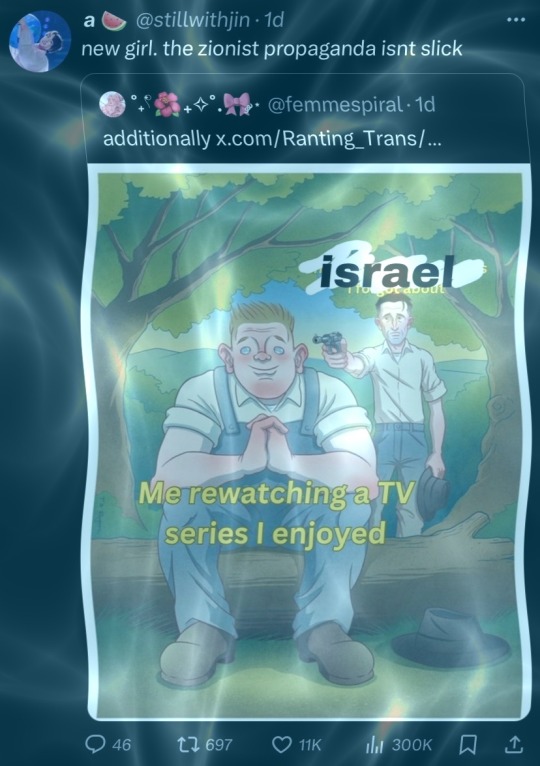
according to the replies on this tweet literally every tv show has Zionist Propaganda™️ so i guess the hamasniks are just going to have to twiddle their thumbs for entertainment
edit: some of the nonsense from the replies
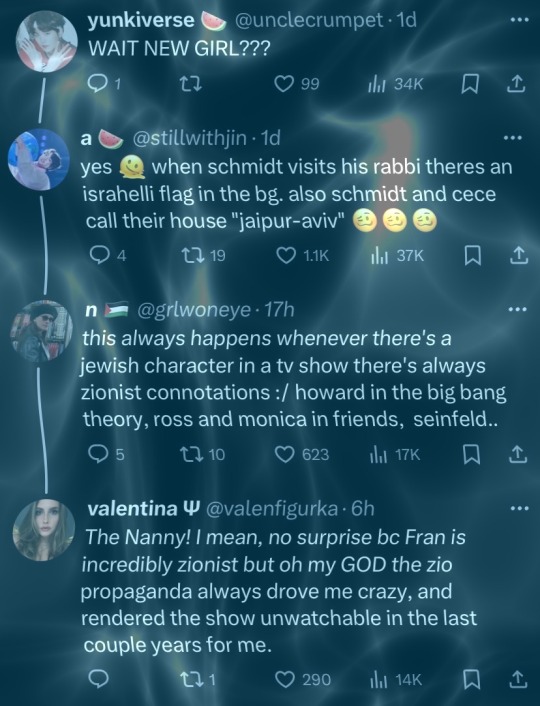
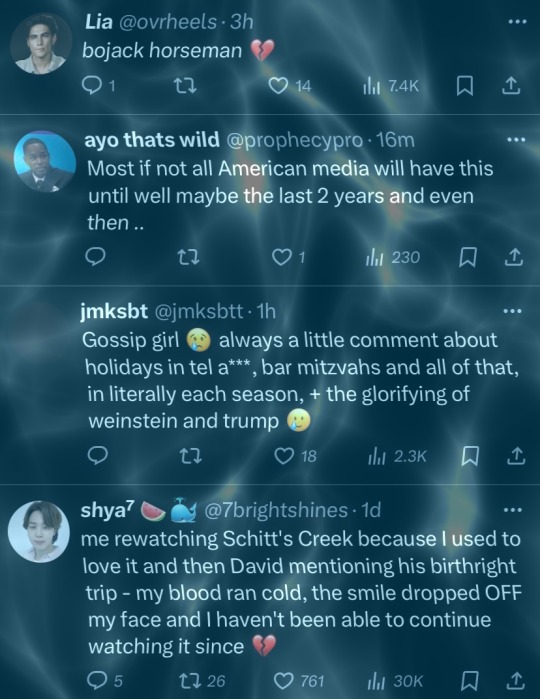

do not call yourself progressive or inclusive or revolutionary or anticolonial or whatever other fucking “I’m A Good Person” label de jour you’ve chosen if you say shit like this. you cannot talk like a Nazi and then insist you’re just an antizionist.
#the antisemitism is sooooooooo mask off w this one#any mention of Israel is as good as literal actual government sponsored proaganda to them#apparently new girl is zionist propaganda bc there’s a scene in a synagogue w an israeli flag in the background#no i’m not joking that was the justification#also someone said schmidt has ‘zionist republican vibes’ oh my G-D JUST SAY JEW#I KNOW YOU WANT TO CALL HIM A KIKE JUST SAY IT#at least have the balls to be racist all the way instead of hiding behind moral superiority#other offending shows and movies included:#ncis#the nanny#law & order: special victims unit#gilmore girls#world war z#gossip girl#crazy ex girlfriend#ugly betty#the marvelous mrs. maisel#blue bloods#heathers#the good wife#how i met your mother#bojack horseman#antisemitism#judeophobia#leftist antisemitism
447 notes
·
View notes
Text
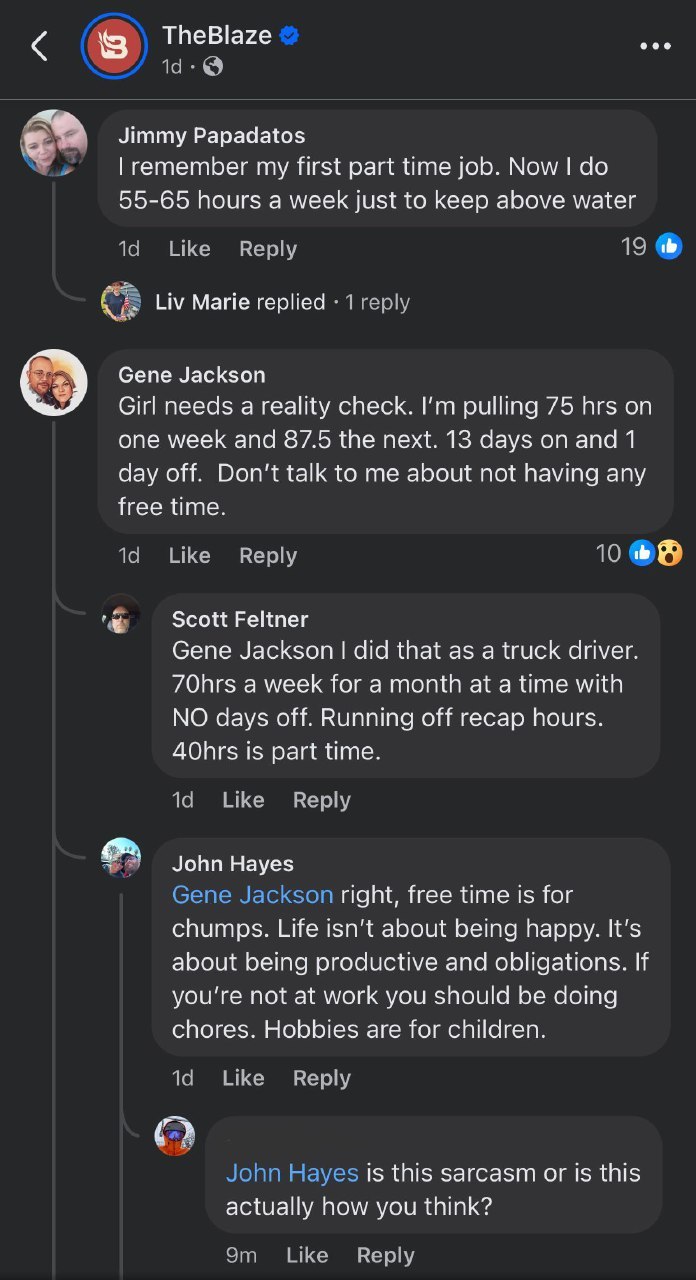
Conservatives have the most bizarre mindsets.
#Conservatives have the most bizarre mindsets.#conservatives#conservatism#conservativism#conservatives are morally bankrupt#ausgov#politas#auspol#tasgov#taspol#australia#fuck neoliberals#neoliberal capitalism#anthony albanese#albanese government
731 notes
·
View notes
Text
Young Justice and especially Superboy should get more credit for (accidentally) blowing up Mount Rushmore.
Possibly the greatest use of Tactile Telekinesis ever.
#yj98#kon el#conner kent#superboy#dc comics#it's still the morally correct thing to do even if there isn't a secret evil government lab hidden inside the mountain#mount rushmore itself is already an evil government instillation open to the public#rambles
207 notes
·
View notes
Text
As much as I lovelovelove Mystery Trio AUs- these three unhinged men should NEVER spend any amount of time together in their prime if you want any peace and quiet.
Someone merely mentions the ides of stealing *something* from a government facility? Stan's warming up the El Diablo that he's already taken the tags off; Ford somehow already has the blueprints to the building and Fiddleford has a handheld lock picking device that also knocks out the signal on surveillance cameras.
Ford finds it logical to use essentially chemical warfare on the guards they didn't know would be patrolling as he blows idk, fairy dust, in their faces. Stan notices that several of his personas' wanted posters are up in an office and he stuffs them in a paper shredder as they walk by not because he is embarrassed but because they weren't even good artist renditions of what he looked like. Fiddleford of course finds alien tech that the government officials are testing and pockets in, knowing it will come in handy for his next giant robot.
As they head back to the Shack Stan jokingly suggests knocking over a bank and Fiddleford nonchalantly says they don't need to, he built a printing press the other week. Ford nods, as if this is a completely reasonable response and Stan has never felt closer to his brother.
#bbuzz28#gravity falls#mystery trio#stanley pines#stan pines#stanford pines#ford pines#fiddleford mcgucket#fiddleford hadron mcgucket#they are fiends and I am tired of people pretending any of them have some sort of higher morality than the other#especially canonical Ford 'I am doing a public service by removing radioactive waste the government is hiding' Pines#that's not an exact line from Journal3 but its close enough trust#I know Stan is everyone's favorite criminal but Ford literally has wanted posters across DIMENSIONS#closely followed by his murder robot building bff#and finally his 'pug smuggling' brother#they would be menaces together if they ever got over their communication hang ups#also if Bill wasn't ya know-himself#but this isn't about him-this is about The Boys and what they could have been :'(
87 notes
·
View notes
Text
I think Danny Phantom fandom is absolutely sleeping on the sheer dumb bulshittery Danny, Sam and Tucker generate on the regular and it’s a fucking shame. Like, the three of them have exactly one (1) single braincell between them, and the only one to use it at least semi-regularly is Jazz. You literally can’t leave them for five minutes without them stumbling into some new bullshit every single time. Granted, a lot of times bullshit finds them first instead of the other way around, but by god will they make the situation worse. They run into the situations with the same reckless abandon the cockchafers fly into any solid obstacle in their way, and you’d think that at least one of them will be the voice of reason, and you’d be dead wrong.
Danny? He thought pranking a murder happy millionaire with a vindictive streak the size of Grand Canyon was a great idea. And then, like a moron, he decided to use equally murder happy government agency with a huge prejudice against ghosts and a vendetta against him, personally. Absolutely nothing that could go wrong with that, obviously!
(spoiler alert, things did go very wrong very fast)
Tucker? A valid choice at the first glance, except he is always down to commit crimes for either his friends or just for funsies. Remember that time he ran an obviously illegal babysitting scam business? Or that time when he brainwashed and then dimensionally displaced the whole school into Ancient Egypt setting? Another notable instances of Tucker being a menace, in no particular order: organised o pro-meat protest in a few hours, tried to shoot a ghost with his phone as a projectile (and succeeded), sold Sam out to a ghost out of sheer pettiness, gave Skulker an alarm-induced ptsd, almost killed Danny that one time (don’t worry, Danny was fine) and in general committed to being bullshit-enabling gremlin.
Now Sam would seem the most grounded and reasonable out of three of them, but it is what SHE wants you to believe. She is just as, if not more, unhinged as the boys, she just hides it better. Remember that time she trashed the castle and antagonised a few dozen of armed guards, while having no back up, no weapons, no allies and while being in some shithole in the Ghost Zone? And then basically told a tyrannical asshole with op dragon powers “fuck you and your entire kingdom” in the face? And then rode another dragon who put said asshole through a wall? Good times.
They all seem like perfectly reasonable people at the first glance, and then Tucker and Danny would dare each other to lick that weird glowing green rock, and Sam would roll her eyes and groan about how stupid boys are, and then Tucker would dare her to lick that glowing rock too, and Danny will say, “Come on, Tuck, it’s okay if she’s too afraid to do it-”, and yes, Sam and her mother have many disagreements on a lot of things, but both her mother AND Granny did not raise a fucking bitch, move over, Tucker, or so help her the spirit of Pandora-
They all end up absolutely miserable in ecto-containment units sick as hell with ecto-flu and on all questions answer that no, they don’t know how this happened, maybe it was ghost attack last week, they did get blasted by that green goo, after all, but really, they have absolutely no idea, honest. Jazz suspects something, but she also has no proof and therefore can’t prove anything. In the end, it was one of the worst weeks in their life and they all ended up swearing to not do it ever again.
(they do end up doing it again two months later)
#phandom is SLEEPING on the sheer comedic potential of those three committing crimes together I swear to god!!!!#like I do understand that this fandom loves it’s angst and all#and sam danny & tucker in the same scene together will more often than not end up in stand up comedy instead of angst#but god#GOD DO I WISH THERE WAS MORE OF THOSE THREE BEING DUMBASSES TOGETHER#like imagine them doing idk a heist together or smth#the panic the destruction the potential for reality defying bullshit#the ABSOLUTELY committed eco-terrorism off screen I know I was there#Sam was there bcs of obvious reasons and ended up organising an uprising#tucker was there bcs he’s always ready to commit crimes and stick it to the government#danny was there as moral support only and ended up on wanted lists of at least 7 countries#sam manson#tucker foley#danny fenton#danny phantom
1K notes
·
View notes
Text
house md wildest show on earth. a main character outright assassinates a known dictator, a moment that would be the very beginning or the mid-series crisis in any other show - an act which creates a power vacuum in a foreign nation already filled with child soldiers and genocide, and it's literally only brought up again throughout the season because that guy's wife divorces him over it. and occasionally to explore his relationship with who he is as a person and a catholic after having deliberately taken a life for what he calculates as the greater good, but mostly it's about his divorce
#i no longer think wilson is the most divorced guy ever#sure he's been divorced more TIMES than chase#but the things he's been divorced OVER are way more normal#it is so nuts like . chase. bobbie. rob. bobert. what happened next. in the country i mean#like the president is dead. does his regime crack down extra hard on the ethnic cleansing?#does the power vacuum give the opposition a chance to step in?#how much of what the president said about the people he's wiping out having been in a similar dictatorship in the past is true?#does the nation descend into civil war? is the president's death the excuse the us or england or whoever is waiting for to step in#and assume ad hoc governance thus destabilizing the region even more?#all because one guy in one hospital decided the math was in favor of his killing a guy if that guy was going to order more killings?#absolutely NEVER explored. yeah do no harm and the morals we share with our partners are important#but christ alive. the aftermath of the assassination could be a whole show in and of itself and im pretty sure it just never comes up#house is a show#house md#q
640 notes
·
View notes
Text
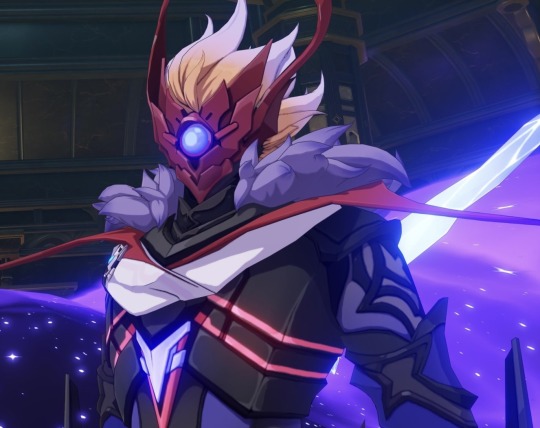
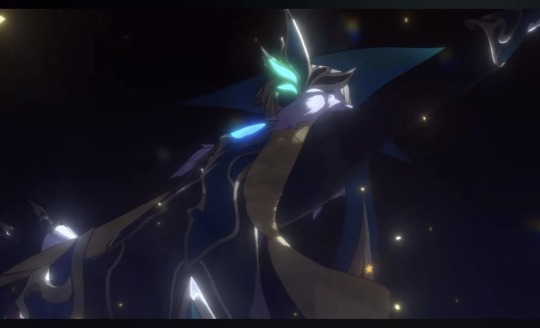
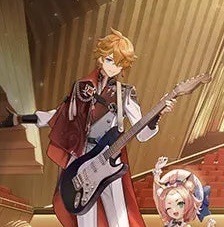
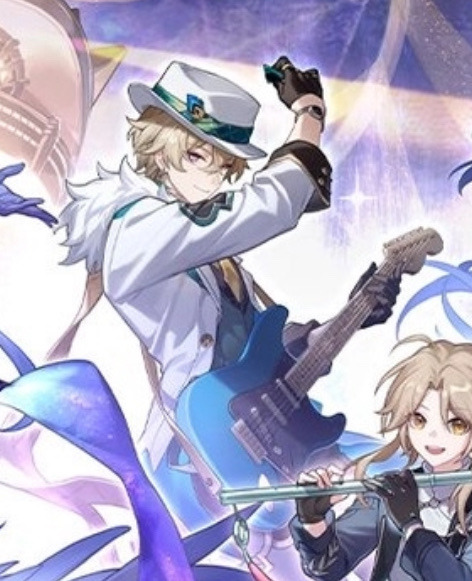
Listen… comparing hoyoverse characters can be a bit annoying but sometimes it’s just too un-fucking-canny to NOT point out
#Genshin impact#genshin childe#childe#honaki star rail#hsr#hsr aventurine#aventurine#hsr spoilers#flump!#don’t let them cook 😭#fellas is it illegal to manipulate an entire government???#I was like ‘yeah okay their boss forms and personalities are kinda similar I can get people comparing them’#and then hoyo gave them both cunty ass guitars and that was too far#lock them up!!! (again)#they both have 52 fake ids and are banned from most public spaces#at least they have an organization to fall back on#kinda? idk neither of them fully like the fatui/IPC#not like either have much of a choice when it comes to leaving lmao#ANYWAY ILL STOP RAMBLING IN THE TAGS teehee#I just love morally grey bitches
152 notes
·
View notes
Text
"As war becomes increasingly computerised, human decision making is increasingly removed from it, and so moral accountability is also removed." 🤔
#pay attention#educate yourselves#educate yourself#knowledge is power#reeducate yourself#reeducate yourselves#think about it#think for yourselves#think for yourself#do your homework#do some research#do your own research#ask yourself questions#question everything#war#computerized war#moral compass#government corruption
70 notes
·
View notes
Text
Makima, devils and self-fulfillment
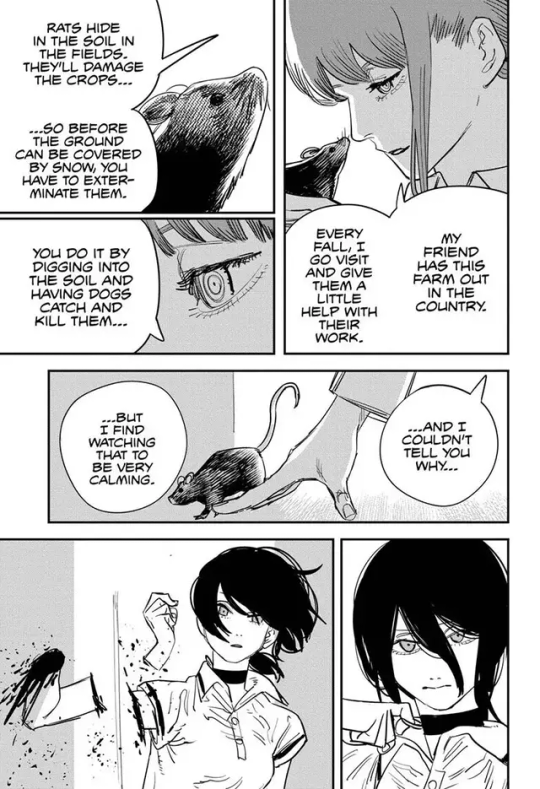
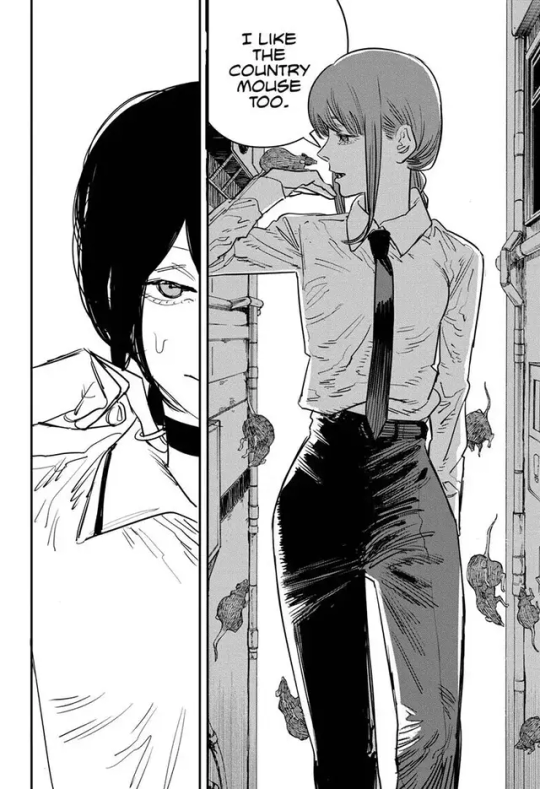
Dumping some Makima and CSM thoughts after a part 1 binge bc I think about her forever and ever. I’m sure I’m forgetting some devil lore, feel free to correct what i get wrong/what’s been confirmed. On the table of contents there’s why & how Makima got fixated on Chainsaw, her revealing liking for the country mouse and discussion of her nature & emotions & desires. Was the scorpion doomed to be a scorpion?
The most of this post was thought of during a conversation with @saccharineomens and I don’t think it makes sense to jump into the spiral it sent me on without first laying down the interesting groundwork theorizing she did:
"Thinking about how makima herself wants to be deified. I wonder whether she recognizes the difference between Love As Worship and the love that Aki, Power, and Denji had. She says she wants to help humanity by having Chainsawman eat the “bad” devils, but why does she want to help humans? Because she was ordered to by the Prime Minister? No, her drive seems much more personal than that, it seems like she teamed up with the PM for contractual reasons. (In the most recent chapters we see governmental members wanting certain devils to be eaten, too. What was Makima’s relationship with them? She’s too independent to just follow THEIR orders, she’s Control.)
So is she wanting to better humanity for the accolades, or out of the goodness of her heart? She sees the big picture. She sees any small sacrifice as worth it for the end result, and she’s ruthless. Perhaps she thinks that a more sedate human race would be easier to control? But Makima doesn’t loathe humanity. She never acts like she sees all humans as lesser. She loves humanity’s creations, like good food and movies. She just wants Good Things all the time
She says she prefers the country mouse BUT adds a story where she helps exterminate country mice like vermin. She likes the simplicity yet rejects the idea of being simple. Makima the complex individual you are"
~
The story itself seems to prefr the country mouse. Well- it strikes a balance, shows that a risk to live good & fully can be very worth it, but still that stability over ambition is preferable, proning having a simple happy life over fame, a simple job instead of a dangerous one, etc etc. And I do find Makima’s answer on this so so interesting, she prefers the country mouse, but this preference isn’t out of affection or sympathy but because of how relaxing it feels to exterminate them when they cause problems.
Order satisfies her. Her order satisfies her. She likes the action of rooting out disorder. Maybe this is the devil part, like how Power especially wants blood and drinking it, I feel there’s an itch to every devil, and for Makima it’s a very rigid world view/morality/standards & making things follow her rules and submit to her order.
And maybe this is why she’s attached to humans too, why she felt it was worth it to stick with the government- because devils are chaotic by nature (it’s a whole plot point that hell is essentially a free-for-all battleground for example), meanwhile humans are the species that universally rule Earth with systems they invented and instilled. They made then enforced rules, complex and intricate webs of them. She feels alienated amongst devils but she understands the humans’ need for an orderly organised society, and now she wants to be part of it. Control and conquest require social dynamics after all, requires civilizations or groups. War is chaotic while peace is, well, peaceful— Makima resents her sisters for being death, famine and war, things that throw the world in such chaos. She wants a world of perfect order, no matter how much collateral damage there will be if the end result is control.
This is even more interesting if you consider that yes, Makima is untouchable of her own design, she deifies herself with her omnipresent amount of control and the sway over others that she seeks and encourages— There is this urge to dehumanize her for it, that yes, she is the devil of control and that means she was never going to be any different, have any more feeling be any less uncanny. And I love part 2 so much for this, because it shows us the war devil and the famine devil and we see how frankly uncharismatic with poor self-discipline they are, Nayuta too, and it helps us realize just how much Makima’s success was self-made.
She admires Chainsaw Devil, the Hero of Hell, because he had his own code and his own rules and he made Hell, the chaos pit, submit to them unfailingly. Wherever he goes he decides what he does and what happens to the people he encounters but does so consistently, he has his mechanism and his rules that he always obeys, and he fulfills them every time. It’s still a mystery the why of Chainsaw Devil’s behavior back then and how it works exactly, maybe Pochita left hell because he was tired of these rules he lived by like chains, but still, he was a servant to his code. Makima would have been glad being killed and eaten by Chainsaw Devil because it’d have been becoming part of his design, his conquest, his domination, she’d have been part of that —his— order. Through her death she would be shaping his world and be part of a conqueror’s making history. Like how she appreciates the country mice that die for the sake of order. Like how sacrifices must be made to herself, like listing the name of every person whose life was lost to the Gun Devil— All for the ~greater good~, for her vision for the world. Conquest always thinks its reasons are justified.
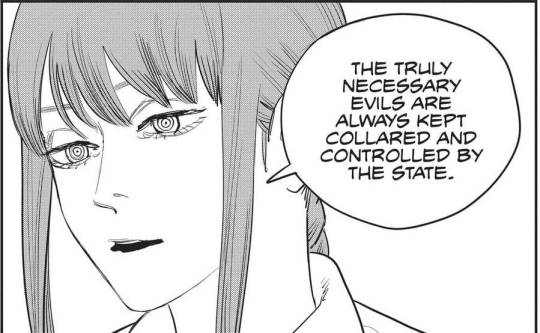
And she does mention with the country mice thing that she goes out to a friend’s farm every year! She has a human friend?? That she visits yearly and she genuinely likes it?? Ultimately she lives a busy city life because of her goal and drive and her urge & satisfaction with overseeing shaping the world herself, but part of her, like so many characters including Angel and Aki and Reze, wishes she could live a slow peaceful country life. Moviegoing and dogs and mice in a farm- Wouldn’t it be so much simpler if Makima could find fulfillment and happiness in being a farmer, in keeping control of her own farm, getting satisfaction from exterminating vermin and expertly getting everything right, the right crops grown at the right time on the right soil? Here, too, in a way it’s trying to have full control of an ecosystem, but her goals would be easier to achieve and better, without ceaseless sacrifice or much pressure. But Makima wants grandiosity and her goal does matter to her on a fundamental and moral level, she does think she knows what’s best for the world, and with the power to change it why wouldn’t she strive to? Visiting the farm is just a break, just something she does in fall to help out and just in time to see the vermin extermination. It calms her, then it’s back to actual work.
In capitalism, even the one at the very top of the ladder is ultimately alienated from others and often unsatisfied by their lifestyle, always wanting more and more power because surely that’s the extra edge they must be missing to be content— like how Makima thinks she wants to dominate Chainsaw Devil instead of being his equal. And she says it herself too, she likes humans the way humans like dogs…….. And she keeps so many dogs :( Makima prefers the country mice because they’re calming to root out, maybe because she usually mainly deals with city mice. It’s very easy to equate humans to the mice in this allegory because it’s pretty direct and she’s already likened humans to lesser animals compared to her. She’s self-isolating by design for her design but she still craves relationships and contentment, and the dogs are the embodiment or her want for bonds and occasional simplicity because there is no possible ulterior motive, no way they tie back into her wider plan. They’re her personal life— something that feels so alien when speaking about Makima. Personality and individuality and likes and preferences and friends they visit every year. She likes how easily she can train a dog and how they become putty in her hands, at her beck and call, how much they love her and how much she enjoys their love. How simple and straightforward and easy it is. She keeps them because she likes being loved by them and loving them, and she’s gotten and raised so many. A conqueror always wants more and more and more, is never satisfied.
Devils and agency
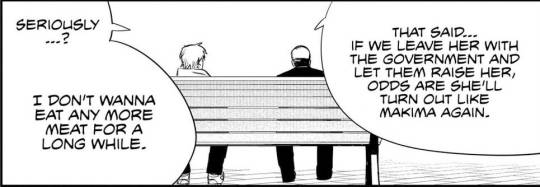
Like Power the blood devil wanting blood and having a fixation on drinking it like with Denji’s, or how it was shocking that the violence devil was pretty tame and nice and how he himself theorized it was because he was a fiend and possessing a human body… There’s something to be said about nature vs nurture with the devils. The way they reincarnate and always embody their fear makes it seem categorically like nature, that they always always end up fulfilling the role they were named after and born to fill… Outside influence they’re helpless but to conform with. Like the humans accepting their spot in the social ladder and the shittiness of their living conditions and job under capitalism. Makima craved being equals with someone despite being the control/conquest devil, Angel Devil despite claiming to be a devil who likes to see humans dying was haunted by their deaths and wanted to avoid ones like Aki’s. The Ghost Devil being ironically haunted by Himeno, seemingly helping Aki in her memory out of… Lasting affection? Or maybe it was less about being haunted itself and more about it recognizing how Himeno haunted Aki, and acknowledging that, with the memento, paying her respect to the ghost of her. It’s Angel Devil’s devil nature that makes him like human suffering, so then is it his angel nature too to still care about their deaths? Is there truth to this or is that just personality, just our confirmation bias haunting every part of their identity like it might in their own view of themselves too? We do know different reincarnations of devils do have different personalities after all.
Yoru, war devil, is the most interesting one when talking about the nature vs nurture debate with devils. There is how through her we see the perhaps the most the consequences of a devil stopping being feared— we see a horseman for a concept as universal and horrifying as war be reduced to some bird who needs a contract with a human to have any power even just on the situation when meeting Asa. And through the story we get to know her better, and it becomes clear that her goal is fueled in good part by simply wanting to be remembered and respected through fear. Liked, validated, seen a powerful. But what is more isolating than war? Or control? We also see Nayuta accepting others’ house rules. If part 1 shows perhaps the futility of running away from the truth, with Denji’s memory, with escapist coping mechanisms, with passivity and denial under a corrupt system and with abusive relationships- running away from your own feelings and from the reality of things and from all that you are, more complex than simply human or devil or both or neither— part 2 builds upon the theme of cult of personalities, the chainsaw church, etc. The apocalypse is coming, but this celebrity superhero might save us all, or doom us all uh, dunno. The hero of hell reliving the cycle of pressure from responsibilities and expectations, maybe the part will end with Denji running away like Pochita did~
But yes, on the reverse, I think Famine is a very interesting example of how a devil’s namesake may be more innate than coerced by circumstances. One would think that a famine devil would only like inflicting famine upon others, not being famished itself, but Famine has a bottomless stomach that can never, ever be satisfied, sated. I struggle to find a psychological explanation for this, except that maybe instead of her being hungry it’s her feeling empty when she’s not eating, tasting and having that high sensory experience that releases serotonin in humans, sort of like drugs? But I do take this as a step towards the compulsion theory overall, feels like a reach in the consistency otherwise. And compulsion does not mean it’s something that they like nor that it’s something that they fight against, pretty neutral, just a nature that nudges you towards one path. Maybe it’s even just their go-to for entertainment. Maybe it’s the only thing that makes them feel right and whole. But still the debate remains, what is it, a compulsion or an urge or an itch or an active desire or a conscious chosen want? Does it change anything in practice?
And because of all of this earlier, devils being self-fulfilling prophecies with their role is not in unsignificant part nurture, because doing their atrocities is how they stay remembered— feared, powerful, known— hell and devils are a very isolating place and breed after all, and we do see devils can want companionship. Existentially, it’s their purpose and how they justify their place in the world, in the terrifyingly vast and unknowable cosmos.
We still know so little of what makes Chainsaw Devil so special, why his carnage is so self-controlled. Despite a chainsaw maybe being possibly one of the most "nature" thing you can be— a tool to cut things, a human tool that can be helpful for many things, something to be wielding by another at their judgement on what they decide, but mainly something to cut, a tool suited for carnage, to hurt and to destroy. A blade with a toothed chain, spinning around and around and around endlessly on the same road at the same pace. Such a…. Innately circular concept. And yet the Chainsaw Devil is his own, not driven by an urge or by chaos but his very own brand of order, his own unique assigned purpose, a "if you call i’ll come running to help" policy equalizing everyone. He chooses to withhold his destruction and interference otherwise, and then he chooses to be used. If it’s a choice, of course.
Maybe this is what inspired Makima so much, that Chainsaw Devil could decide what to make of himself despite expectations or innate role. Because even Hell he decided & managed to subjugate under his will and whim, with a precise vision and process. When Chainsaw Devil acts like Denji or is defeated, Makima clicks her tongue and loses her admiration and respect. Makima admired and liked Chainsaw Devil, but only as long as he matched her great image of him in her mind, as long as he followed he rules for what she thinks he should be like. She admired him for his unrivaled self-made success, but once he stepped out of that to truly embody self-fulfillment and agency, disappearing from hell to live on his own road at the beat of his own drum… Well. Surely that was a mistake she has to correct. However their second battle ends, the better conqueror will have prevailed and she’s happy about that, all in the spirit of domination and subjugation.
Imo Makima’s biggest tool, similarly capitalism’s most helpful effect for its own purposes, is complacency. Resignation and passivity helps uphold the system and go along the flow of the will of the people in power. Aki and Reze go along with orders even when knowing their job is trash, etc. In Angel Devil especially we see him go along with the flow uncaring about anyhing, and we discover it was in part due to Makima taking away memories that motivated him. If every devil decides this is just how things are and how things should be that’s what they’ll continue to be and do mindlessly, not pursuing a better life like Chainsaw Devil and Denj and not seeking to change the world like Makima. I think even Makima veils herself to a lot of things, she doesn’t like to think deeply about some things, like her desire for connection, or how making bad movies disappear is strenuous and unsustainable and requiring sacrifices at best— how her judgement is as subjective as anyone else. How liking the country mouse and her friend back at the farm and her dogs could be not devoid of sentimality. Wanting bad movies erased is her one biggest show of selfishness, of pettiness and individuality, it’s about her tastes, simple as. About how she can have tastes, and cry seeing a scene of people hug, and want things that aren’t logical, her ideology and mind twisted into a pretzel to avoid acknowledging that she doesn’t live and breathe purely for the mission she’s made a single-minded robot out of herself to accomplish. Nayuta is assertive and selfish and loud, Makima is manipulative and strategically both for her goals and for coping hollow.
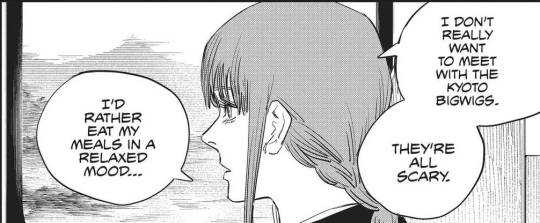

Everything in her plans and goals she says is for the greater good, necessary evil, manufactured happiness the way she’ll have decided for people— and that’s the thing isn’t it, like with War, it’s the crack that shows it was all truly about herself after all. Her self-made deification still had the flaw that a self made it. Makima is not omniscient, and it’s not Chainsaw Devil the not-so-fellow-kindred-soul conqueror who gets the best of her, but a city mouse, a dog, someone she would have never thought to respect, Denji.
#Fumi rambles#Chainsaw man#makima#analysis#meta#The goal is moreso me dropping thoughts than being flawless on every aspect of the lore so if and when i get things wrong b merciful….#Maybe her liking of control is why she remembers the ww2 authoritarian fascists. I don’t want to say the word jic for tumblr search#Pity is never a factor When mercy is a sign of a talentless actor#And as you grow its hold on your throat starts to falter And once you go beyond pure humanity's border#You will come back like a dooooog 😭#This’d be a different topic but. I don’t think makima likes denji as much as one of her dogs. If so i’d say it was in the moments where#she brought him to movies but even then….. i think she has more fondness for her dogs bc w denji it was indifference and derision#I love you please humiliate me / strip my dignity and laugh my honey#God. God i’m fine. I’m so okay about csm#Makima has a cryptic but strong sense of morals?? That doesn’t align with ours obvi but#‘Someone like you has no right to wish for a normal life do they?’ What do you meannn what do you meannnnn#What is this contempt for denji. Does she see herself as moral or part of those that are city mice bc they’re undeserving of a calm life???#Maybe famine only feels fed on humans and their blood 🤔 or their fear. man idk idk idk idk but i wanna see more of her quirks#And before someone says ‘but every demon likes to drink blood’ power is especially fixated on it tho cmannnn#Did Angel lie when he said he liked seeing humans die?? Did his haunting thing become worse after meeting Aki?? Did he suppress it#because he feels like he doesn’t belong as a devil??? bc he’s suppressing his memories of the villagers he cared about??#Has he just been trying so hard not to care for so long. Passive bc he thought that’s all he could or should be#AGHHHHH#Spoilers#There’s a lot more i’d have liked to touch on like the popular theory that Makima was *raised* by the government#and i’ve seen a take that the ‘my friend at a farm’ thing is all euphemism from makima about her troublesome human killing job ykyk#but i think the phrasing is too literal and natural for that. The snow and soil talk everything. It’s a perfect allegory but it can be both
44 notes
·
View notes
Text
Although HeroAca's ethics are conscientious, we can also see a glimpse of modern dangers. At least as far as the developments to date are concerned, it seems that at the base of the work lies naive nationalism and a lack of imagination toward the situation in which official authority expands in the name of "justice." However, this nationalism seems to have an inclusive character, just like the nationalism of nationhood, which is another hidden basis of "Shounen Jump Values." As a fusion with such nationalism, we may be able to see in HeroAca the aspect of a higher level of community ethics that is relativistic and individualistic, yet aware of responsibility to "others." However, according to Karatani's logic, nationalism, which is a "(insular) community" way of thinking, should be in conflict with "(broad) social" thinking. Perhaps in the case of nationalism as a nationhood founded on universal ideals and principles, it does not actually contradict "social" thinking.
Still, it is important to note that even such nationalism is always in danger of slipping into exclusionary logic when a crisis occurs. Although HeroAca clearly denounce dictators, it does not have the imagination to understand that historically, bureaucrats/civil servants were the means by which rulers carry out their rule, so the current positioning of Heroes is a status that could support movements such as the state control of society that occurred in Japan in the late 1930s (fascism). [HeroAca fails to show enough wariness towards social control by public authorities.]
...
In that sense, if Heroes are imagined as an entity rooted in the network of "Hero Agencies" in the story and its spiritual ethics are depicted as maintaining a healthy tension with the state, then its ethics may be considered to be truly "social."
Nihilism and ethic in Shōnen Manga as romanticism : "Attack on Titan" and "My Hero Academia", Anna Eto, 2018
(translated by me)
#for anon#I'll answer your ask properly later!#but it reminded me of this paper#nalslastworkingbraincell#i think the thing that's most important to remember about the story#is that Heroes aren't just Wow Superheroes!#They're like government employees/contractors#they work in service of the state#(Geten: 'dogs of the state')#which means when they do questionable things#it looks real bad#obviously the villains aren't super moral and democratic either#Shigaraki is pretty much omnicidal#but they're the bad guys#you gotta hold the heroes to a higher standard
86 notes
·
View notes
Text
Bit of a shame I left hp before I entered svsss because one of my favourite tropes at the time was 'dumbledore calls in External Support from different fandom during ootp and they show up to grimmauld to help (and utterly upstage everyone in the process)'.
And needless to say Sqq, at any point, would have been perfect.
Like. He's a teacher too. A scholar. Secretly from the modern world so he'd have no trouble with its intricate and mysterious workings, incidentally making himself look very cool and competent in the process. He'd have So Many Opinions. He'd incite bloody war with umbridge. He'd project his feelings for sj onto Snape with a side of commiseration for his role and fate. He'd mostly pretend to know so much less about hp than he actually does (which, hilariously, he canonically name drops in svsss, AND his system is pretty heavily implied to have previously worked in, like wow). He'd be constantly comparing Harry with lbh. He'd have a running internal dialogue bemoaning the world building, the characters, Harry's fate, the general decision making process, maybe some death of the author. Geeking out about magic. Raiding the library whenever he's free.
He might bring his students as part of an exchange, he might bring a fellow peak lord if it was a serious mission (liushen anyone?) he could bring adult lbh. Maybe sqh? Or sqh could be the messenger with the system and/or mbj.
A self aware character who couldn't live with himself if he didn't at least try to change Harry's fate whether or not he actually likes the kid? He could canon that divergence before you could say horcrux. That kind, oblivious, smoking hot exotic teacher who had people ruining their lives for him in a world that was used to people that pretty and also hated him specifically?? The hogwarts students wouldn't stand a CHANCE.
Man the scenes are coming to me so strongly I almost want to write it just as a like. Satire piece or something. Just Sqq ripping everything to shreds, accidentally or not. Diatribes on the author biases. Unintentional themes. Iffy world building choices. Nothing new, but through the lens of svsss' Sqq it'd be something for sure XD.
#Okay imagine. Sqq and umbridge being introduced side by side at the start feast.#And you've got a) condescending ugly old government stooge invader. Short and round. Terrible fashion sense. Trying too hard.#B) the most ethereal person you've ever seen in your life. Flawless glossy classy af. Tall and slender. Immortal from a distant land. Sword#This makes umbridge feel humiliated and inferior (this makes her much more vicious from the start) and Sqq is just ranting internally#About the meta textual correlation of beauty and morality which a) yikes b) he's wondering if anyone in the hp universe has realised#Or used to their advantage (he has a paragraph on riddles beauty he weaponised and then lost)#Kind patient a good teacher he's got a sword and supports the Prank Resistance those poor boarding school kids would WORSHIP#And they'd make it so hard to be oblivious lmao.#Ooooh flying swords vs brooms quidditch?#He'd 100% do a class or session on trans issues just to be petty#I do miss hp and the sheer size and breadth of the fandom on occasion but well. You know how it is#svsss#hp#harry potter#scum villain#crossover#fic ideas#fic prompt#He'd join spew and in a day everyone in school would support it lmao#shen qingqiu
53 notes
·
View notes
Text
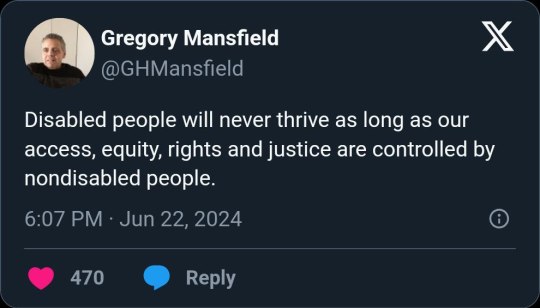
#ableism#ableist language cw#tw ableist language#fuck ableists#ableist bullshit#science#human rights#ausgov#politas#auspol#tasgov#taspol#australia#fuck neoliberals#neoliberal capitalism#anthony albanese#albanese government#law#morals#ethics#class war#oppression#repression#poverty#homeless#earth#society#humans#humanity#community
267 notes
·
View notes
Text
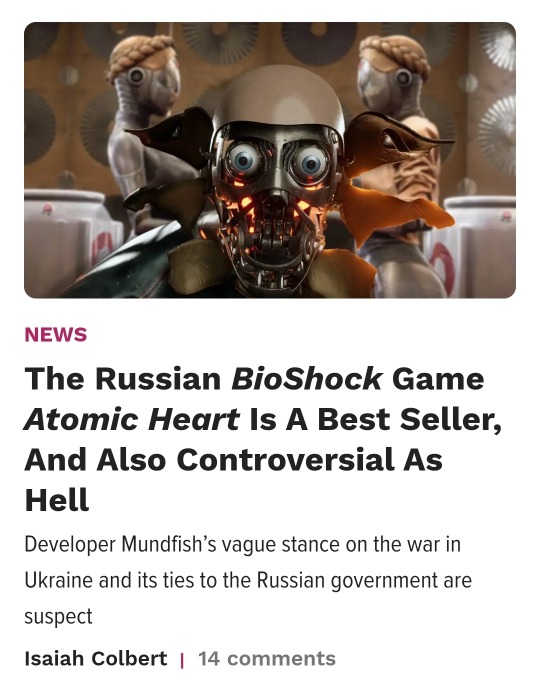
Kotaku libs will post shit like this and then go back to fellating Call of Duty one article later
#kotaku#atomic heart#don't know how much it needs to be hammered into angloids to stfu#you have zero moral ground to stand on when it comes to games having 'shady connections' to governments lol
813 notes
·
View notes